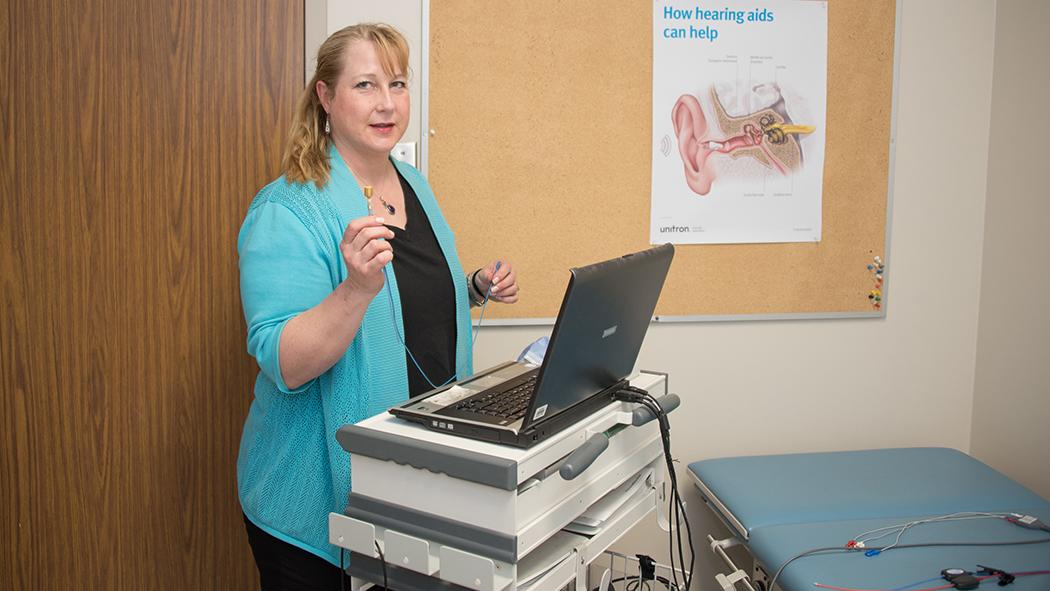
May 15, 2023
Audiologists are specialists in the assessment, diagnostic testing, and rehabilitation of hearing disorders. At London Health Sciences Centre (LHSC), there is a strong team of audiologists and other specialists who work to diagnose and treat hearing and balance disorders.
Audiologists are largely known for their work in hearing (e.g., hearing aids and cochlear implants), however it is important to note that audiologists can play an important role in assessing and treating vestibular functioning – the functions related to balance and feelings of dizziness.
The inner ear is an organ of hearing and balance. The vestibular system refers to the parts of the inner ear that are involved in balance and equilibrium. There are sensors in the inner ear that send signals to your brain that detect motion and gravity, and contribute to your sense of balance.
“Imbalance and dizziness are two of the more common reasons people visit their primary care doctor,” Nicole Lanthier, Audiologist at LHSC who works with patients experiencing dizziness and balance issues states. “When these issues are not addressed properly, it can be debilitating.”
When a person experiences imbalance and dizziness, it can prevent them from engaging in work and their regular activities, and it can also create safety issues. There is a higher chance of falling and injuring yourself when feeling dizzy and off balance.
Nicole explains, “While many balance disorders are common in middle and older age, we see all ages. This is not just something the elderly experience.”
Audiology at LHSC
Since LHSC is a tertiary care centre, audiologists within the organization largely focus on diagnostic vestibular care. The majority of patients with dizziness and balance concerns are seen in conjunction with the Otolaryngologists at University Hospital.
Hearing and middle ear assessments
Audiologists at LHSC meet face-to-face with patients and provide hearing and middle ear assessments. In terms of balance testing, they perform electro-physiological testing procedures such as VEMP and ECOG tests.
HOW DO VESTIBULAR DYSFUNCTIONS OCCUR?
Some individuals can start to experience dizziness and imbalance related to:
- A virus that gets into the inner ear.
- Autoimmune disorders.
- Trauma, such as blows to the head, concussions or other physical injury.
- Side effects from other medical treatments such as medication that may affect the inner ear system.
“Some patients that we see with vestibular concerns can have nothing in their health history – whether it’s a risk factor or past event – that would seem to lead to them having dizziness or balance issues. Sometimes it can seem to be spontaneous,” says Nicole.
STRATEGIES USED TO HELP PATIENTS WITH VESTIBULAR FUNCTIONING
"The strategy used to help a patient experiencing issues with their vestibular functioning entirely depends on the situation,” explains Nicole.
Some patients may have a chronic inner ear disease such as Ménière disease – which can cause dizziness, hearing loss, a sensation of pressure in the ear, and ringing or roaring noises in the ear – and would require medical management. Audiologists would follow patients in this situation over time and track their symptoms and hearing loss as the physician manages their symptoms with interventions such as dietary changes, medications, and sometimes steroid injections into the middle ear. The audiologists assess hearing during treatments to monitor and help prevent negative consequences to hearing if possible.
For other examples, some patients may be referred to a vestibular rehab physiotherapist if there was permanent damage to hearing from a viral infection. Other times if a patient were diagnosed with a tumour, they could require surgery or long-term monitoring of hearing and other symptoms, depending on the situation.
“I find that patients are often intimidated or scared of receiving balance testing,” Nicole says. “The testing is not always comfortable, but when steps are explained it becomes far less frightening than imagined. We do our best to make sure patients feel informed and as comfortable as possible.”
Nicole notes that there are interventions for balance and dizziness concerns, “Don’t necessarily put it down to aging, it’s worth pursuing further assessment because there is help available.”
Audiologists at LHSC work as part of an interprofessional team who work together to provide excellent patient-centred care.